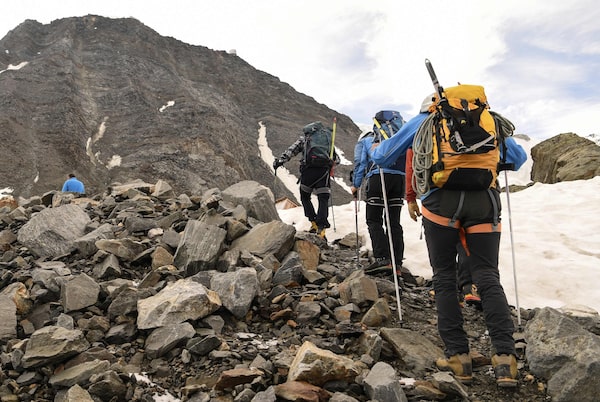
A group of mountaineers take the 'Couloir du Gouter' on the 'Voie Royale' route to climb atop the Mont-Blanc peak on Aug. 6, 2018, in the Mont-Blanc range near Saint-Gervais, eastern France.PHILIPPE DESMAZES/Getty Images
Bill Walker admits he’s been a bit cavalier about insurance when travelling for sport in the past. But his attitude changed this winter when multiple skiers and their guide died in an avalanche on the same backcountry route in Switzerland he had skied just days earlier. Now he plans to pay close attention to his coverage every time he travels out of Canada.
“It’s not worth it to not have insurance, because you can do everything right” but things can still go completely wrong, said Mr. Walker, who lives in Toronto and has travelled for outdoor sports and competitive races for decades.
The global adventure tourism market is projected to grow rapidly in the next decade, from a value of US$366-billion in 2022 to US$4.6-trillion in 2032, according to Allied Market Research. But lawyers and insurance brokers say travellers aren’t always aware of the limitations of the basic travel coverage they may have either through a credit card or work benefits – or even from a policy they purchased without asking the right questions.
Buyer’s guide: Travel insurance for snowbirds
On his recent trip to Switzerland, Mr. Walker was insured. At first, he was going to use a company that would have charged about $30 for backcountry skiing coverage. But after reading the fine print, he realized the contract did not cover the type of skiing he was going to do. So he went with another insurer, Global Rescue, which covered his trip for $150.
To him, the cost was well worth it to protect himself and his girlfriend from the fallout of a major accident, including possible financial ruin.
Nainesh Kotak, of personal injury law firm Kotak Law, says he’s seeing more clients lately who have had their insurance claims denied because of the activities they were taking part in when they were injured. While some claim denials can be disputed, he says, many people find themselves completely out of luck.
“Some of them are pretty clear-cut against the claimant where there’s a specific exclusion,” Mr. Kotak said.
And those exclusions aren’t always so obvious.
“This is coming up more than ever, but really, to the layman out there travelling, they don’t know and they think they’re already covered,” said Martin Firestone, president of Toronto-based insurance brokerage Travel Secure.
Sports such as rock climbing, backcountry skiing and cliff jumping are inherently dangerous, so it may be assumed that you need extra insurance coverage for those. But Mr. Kotak says there are exclusions for very common activities that most travellers would not be aware of unless they read the full contract of their insurance coverage.
One of the most common activities that get people into trouble is jetskiing. While it may seem like a fun thing to do during a beach vacation, Mr. Kotak says the rate of injuries on jet skis is enormous. As a result, many insurance companies exclude them from basic coverage.
He says some basic plans also exclude ziplining, scuba diving beyond certain depths, hiking off-trail and sports such as skiing and cycling when you exceed speeds of 50 kilometres per hour.
Mr. Firestone says insuring yourself for riskier activities is often not all that expensive, but consumers need to take initiative to confirm that they’re covered.
One quote he generated for a person in their 40s to go downhill mountain biking during a short trip came to roughly $95.
Comparing pricing for this kind of insurance product isn’t a simple task, Mr. Firestone says, partly because the deductibles, the amount of money the insurer will pay and the coverage exclusions can vary widely.
“It’s not as simple as what’s the cheapest insurance in town, because if it’s cheap there’s probably a reason,” he said.
A ‘be prepared’ checklist for vacationers
In his opinion, any premium that insurance companies charge is worth paying, because there’s an elevated risk of personal injury when participating in the aforementioned sports, and the costs for hospitalization or evacuation could be enormous.
The most important factor when shopping around is to make sure you’re covered for every aspect of the sport you’re doing. If you’re scuba diving, are you covered for the depths you’ll reach? If you’re skiing at a resort, but will occasionally go out of bounds, will that be covered?
Mr. Firestone says it’s easy to be left in the dark about some of these details when purchasing insurance online. It’s vital to speak to a real person, whether that’s a broker or an agent with an insurance company, and ask many questions about your coverage limits.
Are you a young Canadian with money on your mind? To set yourself up for success and steer clear of costly mistakes, listen to our award-winning Stress Test podcast.
 Salmaan Farooqui
Salmaan Farooqui